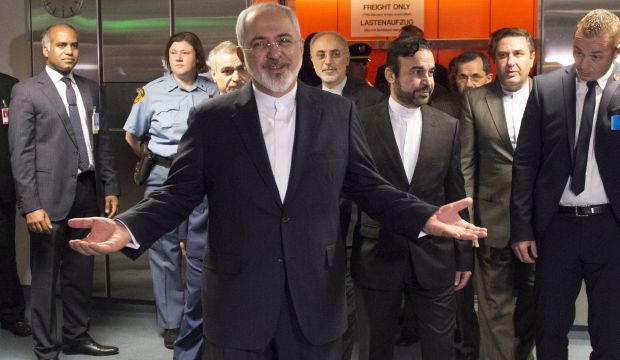
Iranian Foreign Minister Mohammad Javad Zarif arrives for the final plenary meeting at the United Nations building in Vienna, Austria, Tuesday, on July 14, 2015. (Joe Klamar/Pool Photo via AP)
In the best case scenario, Iran may draw even closer to the United States by casting itself as a force for stability in the region. This week, Russian Foreign Minister Sergei Lavrov revealed a telling episode in the Vienna talks. According to Lavrov, Russia and China pressed hard for the embargo on the sale of arms to Iran to be lifted immediately. Both, of course, had hopes that the lifting of the embargo would enable them to capture big chunks of the Iranian arms market before others rushed in. According to Lavrov, the Iranian team did not press for an immediate lifting of the embargo, thus siding with the US team led by Secretary of State John Kerry.
The reason is obvious. President Hassan Rouhani hopes that in five years’ time Iran would be so close to the US that it could buy American arms. Who wants Russian and Chinese weapons?
For his part, US President Barack Obama has made it clear on a number of occasions that if Iran changes its behavior, it could become a key American ally in the Middle east as it was before the mullahs seized power in 1979. An Islamic Republic allied to the US would have no interest in wreaking havoc in the region by trying to “export revolution” through violence and terror.
In that best case scenario, Tehran would reconvert its terrorist networks, notably Hezbollah in Lebanon, into political parties loyal to the Islamic Republic. Iran would pursue its interests, including prestige and influence, in Iraq, Lebanon and Yemen through political, diplomatic and economic channels rather than terror and war.
Allied to the US, Tehran will also see no need in keeping Bashar Al-Assad in power in Syria. Jettisoning Assad would help Tehran repair its relations not only with Ankara but also with Arab states opposed to the Syrian despot.
Iran could also rediscover the interest it has in better relations with Saudi Arabia whose support is needed to regulate oil prices away from wild fluctuations. Iran and Saudi have no tangible state-to-state disputes over borders, access to markets and natural resources, and trade rivalry. The root cause of the current cold spell in their relations is Iran’s insistence on behaving as an ideology rather than a nation. Once Iran has moved away from ideology and started to behave as a normal country it could have no difficulty repairing ties with Riyadh.
There is, however, a worst case scenario as well.
Iran’s current rulers may see Obama’s strategic retreat from the Middle East as an invitation to reshape the region after their own fashion. Ali Akbar Velayati, foreign policy adviser to “Supreme Guide” Ali Khamenei, has already announced plans to create “a coalition” led by Iran and including Syria, under Assad, Lebanon, held at gunpoint by Hezbollah, and Iraq, where Iran is building a parallel army. Velayati claims that Algeria is keen to join while “positive signals” also come from Cairo.
Iran is already trying to split the Gulf Cooperation Council (GCC) by wooing Oman, bullying Qatar, courting Kuwait and setting Dubai against Abu Dhabi in the United Arab Emirates.
A new and more aggressive Iran, no longer suffering from cash flow constraints, could emerge to intensify the crisis in Yemen, raise the tension in Bahrain and pursue the dream of a “Shi’ite Crescent”.
Which scenario has a better chance? The answer depends on the outcome of the power struggle in Tehran. If the pro-American faction, led by former President Hashemi Rafsanjani and including Rouhani and his team, wins, one could put even money on the best case scenario. If not, the worst case scenario cannot be ruled out.
